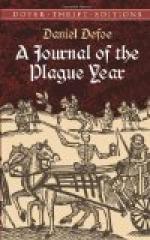I might have thronged this account with many more remarkable things which occurred in the time of the infection, and particularly what passed between the lord mayor and the court, which was then at Oxford, and what directions were from time to time received from the government for their conduct on this critical occasion; but really the court concerned themselves so little, and that little they did was of so small import, that I do not see it of much moment to mention any part of it here, except that of appointing a monthly fast in the city, and the sending the royal charity to the relief of the poor, both which I have mentioned before.
Great was the reproach thrown upon those physicians who left their patients during the sickness; and, now they came to town again, nobody cared to employ them. They were called deserters, and frequently bills were set up on their doors, and written, “Here is a doctor to be let!” So that several of those physicians were fain for a while to sit still and look about them, or at least remove their dwellings and set up in new places and among new acquaintance. The like was the case with the clergy, whom the people were indeed very abusive to, writing verses and scandalous reflections upon them; setting upon the church door, “Here is a pulpit to be let,” or sometimes “to be sold,” which was worse.
It was not the least of our misfortunes, that with our infection, when it ceased, there did not cease the spirit of strife and contention, slander and reproach, which was really the great troubler of the nation’s peace before. It was said to be the remains of the old animosities which had so lately involved us all in blood and disorder;[327] but as the late act of indemnity[328] had lain asleep the quarrel itself, so the government had recommended family and personal peace, upon all occasions, to the whole nation.
But it[329] could not be obtained; and particularly after the ceasing of the plague in London, when any one had seen the condition which the people had been in, and how they caressed one another at that time, promised to have more charity for the future, and to raise no more reproaches,—I say, any one that had seen them then would have thought they would have come together with another spirit at last. But, I say, it could not be obtained. The quarrel remained, the Church[330] and the Presbyterians were incompatible. As soon as the plague was removed, the dissenting ousted ministers who had supplied the pulpits which were deserted by the incumbents, retired. They[331] could expect no other but that they[332] should immediately fall upon them[331] and harass them with their penal laws; accept their[331] preaching while they[332] were sick, and persecute them[331] as soon as they[332] were recovered again. This even we that were of the Church thought was hard, and could by no means approve of it.
But it was the government, and we could say nothing to hinder it. We could only say it was not our doing, and we could not answer for it.




